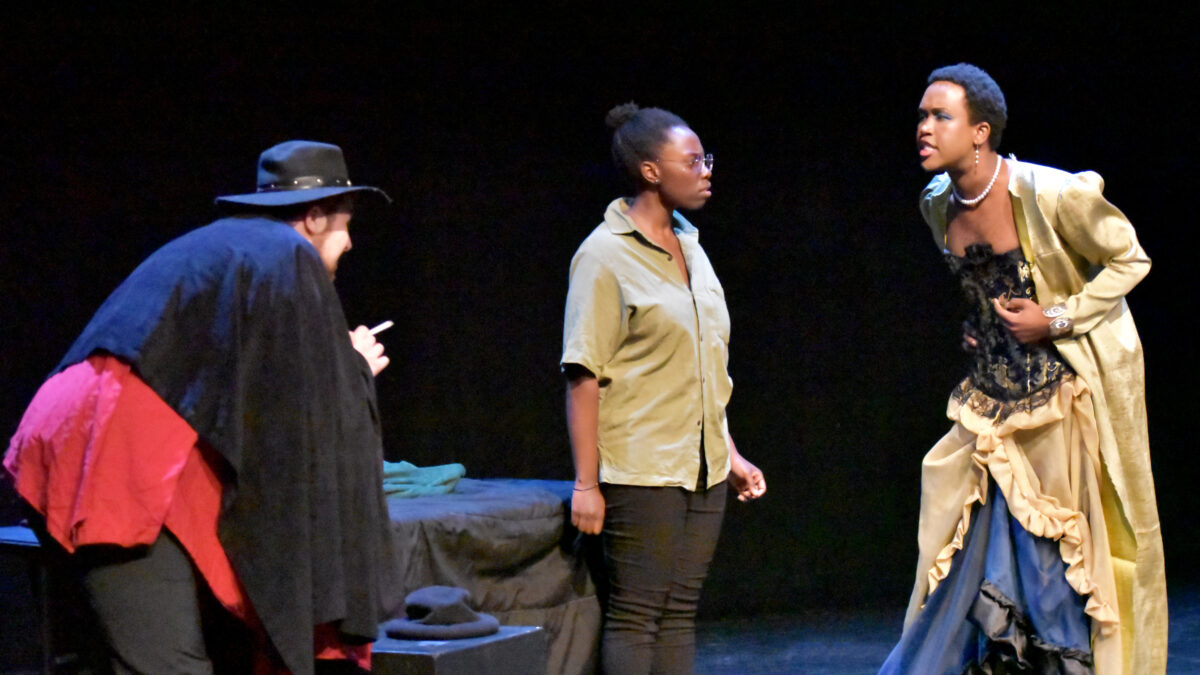
Photo credit: Shaharazad Singh-Sharpe
The Death of a Swan: A Visceral Collision of History and Hope
By Ijeoma Ukazu, Editorial Associate
Ottawa’s Fringe Festival is known for pushing artistic boundaries—and The Death of a Swan, presented by the Moth and Firefly Theatre Collective, delivers that spirit with haunting elegance. This bold return of the award-winning dance-theatre and psychological horror hybrid not only stuns in form and performance but marks a defining moment for Black theatre representation in the city.
Staged at Arts Court Theatre, the show opened on June 12 and featured multiple performances, including a mask-mandatory performance on June 18, before closing on June 21. Far from a mere revival, this version is a reinvention—each performance brimming with new energy, rawness, and insight.
Written and co-directed by Navneel Agnihotri and co-directed, choreographed, and produced by Mirana Rambelo, The Death of a Swan unfolds like a fever dream, blurring the line between reality and nightmare. At its center is Evergreen (played with haunting depth by Canda-Leigh Habonimana), a middle-aged poet and café owner. In the opening scenes, Evergreen beams with determination and hope, celebrating the grand opening of her dream café. Her joy is infectious, and the space radiates warmth and promise.
But time passes. Fast forward a few years, and the café is floundering. Financial hardship, waning clientele, and Evergreen, through her dream, is lured into a Faustian bargain by a shadowy man (Xander Sonnenburg, captivating eerie) who offers to grant her success at the cost of her values. “The Man” is accompanied by two unsettling spirits who have sold their souls and harken a dark future for Evergreen should she follow in their footsteps.
Despite spectral warnings from William Dorsey Swann—the first drag queen in American history, portrayed with regal intensity by Aurel Pressat Irigukunze—Evergreen accepts the offer. Irigukunze’s Swann is mesmerizing, floating between eras and identities, embodying resistance and grace. What followed is a spiralling descent into a world haunted by patriarchal.
Still, the show has undeniable power. At its core, The Death of a Swan interrogates the compromises women are forced to make in a system rigged against them. But it goes further. Through the imaginary, fairy godmother-like character of Swann—too often omitted from historical texts—the play resurrects stories of queer Black resistance and turns them into living, breathing testimony. Irigukunze’s performance is electric, equal parts fierce and tender. No surprise that it earned him recognition at this year’s Youth Infringement Festival. “I got misty-eyed,” confessed one audience member, echoing the emotional pull of his scenes.
This historical layering never feels heavy-handed. Instead, it flows seamlessly, giving weight and resonance to every moment. Jules Graham, who plays the charming Estelle, spoke to the show’s core message: “the importance of historical awareness on our present and potential futures.” That awareness reverberates through the text—these aren’t just characters but echoes of real people, their courage still rippling outward.
Black Excellence on Display
Beyond its artistry, The Death of a Swan is a triumph of Black theatrical expression in Ottawa. From its actors to the production team, the show is a showcase of local Black talent. Moksha Singh-Sharpe, who plays the impassioned Raina, called it “rewarding to witness how this show impacts the hearts and minds of those who get to see it.”
The ensemble is tightly woven and emotionally generous. Habonimana brings raw honesty to Evergreen, saying the role helped them uncover their own emotional truths. That emotional excavation pays off in a performance that is intimate, aching, and powerfully real. Ebehiremen Iyere, who served as both stage manager and costume designer, described the journey from script to stage as “an extremely fulfilling experience.”
In a city where opportunities for Black focused storytelling are still growing, The Death of a Swan is both timely and timeless. It doesn’t just reflect injustice—it confronts it, then responds with beauty, innovation, and bold defiance.
Whether you’re drawn to dance, history, horror, or the sheer force of transformative storytelling, The Death of a Swan was more than worth your time—it demanded it.
Quotes from the Cast and Crew
“The Death of a Swan is a deeply moving experience—it still brings me to tears and terrifies me
every performance!”
— Mirana (Director)
“Being able to witness how this show impacts the hearts and minds of those who get to see it!”
— Moksha (Actor)
“Showcasing the importance of historical awareness on our present and potential futures. These
histories impact the different facets of our lives, and their influence alters depending on how
they’re interpreted.”
— Jules (Actor)
“I love the way it makes me feel to explore the depths of the character’s emotions, and how it
helps me understand my own personal feelings.”
— Canda (Actor)
“To see it come to life! The feeling of birthing and nursing a piece from a script to a show is an
extremely fulfilling experience for me.”
— Ehi (Stage Manager)
“Just when I think I’ve seen it all, this cast and crew still find new ways to surprise me with their
ambition and talent. It has been an honour working with them.”
— Xander (Actor)
To find the theatre collective online, follow Moth & Firefly Theatre Collective on future projects on Instagram: @moth.firefly.tc and Facebook: Moth & Firefly Theatre Collective
Photo credits: Shaharazad Singh-Sharpe









